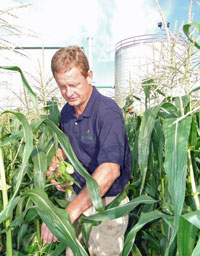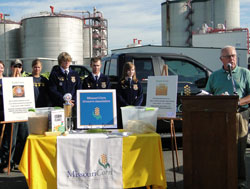 The Government Accountability Office (GAO) has issued a report urging the Department of Energy (DOE) to make changes to its current loan guarantee program to make it more effective. This program is intended to support “early commercial production and use of new or significantly improved technologies in energy projects that abate emissions of air pollutants or of greenhouse gases” including next generation biofuels like cellulosic ethanol.
The Government Accountability Office (GAO) has issued a report urging the Department of Energy (DOE) to make changes to its current loan guarantee program to make it more effective. This program is intended to support “early commercial production and use of new or significantly improved technologies in energy projects that abate emissions of air pollutants or of greenhouse gases” including next generation biofuels like cellulosic ethanol.
The GAO report recommends four steps to be taken by the DOE to improve the program: develop relevant performance goals; revise the process for issuing loan guarantees to treat applicants consistently; develop an administrative appeal process for applicants who believe their applications were rejected in error; and develop a mechanism to systematically obtain and address feedback from program applicants.
The Renewable Fuels Association (RFA), which has been highly critical of the program, supports the GAO’s assessment and recommendations. “Access to capital is a chief hindrance to the commercial deployment of cellulosic ethanol technology,” said RFA President and CEO Bob Dinneen. “DOE has created a loan guarantee program that in theory is helpful, but in practice has proven difficult if not impossible for cellulosic ethanol companies to access. If the goals of the RFS are to be met, the Obama Administration must make sure loan guarantee programs are workable and accessible for qualified companies, regardless of their technology.”
RFA wrote a letter to Secretary of Energy Steven Chu last October raising a number of issues that created unfair and unnecessary challenges for cellulosic ethanol companies. Specifically, the ethanol organization requests that DOE eliminate the requirement that applicants have year-long off-take agreements in place; recognize that applicants, by definition, may not have commercial scale financial data and to consider applications that “employ new or significantly improved technologies compared to commercial technologies in service in the U.S.” as outlined in the law; and review applications that have been declined to determine what fixes can be made to correct perceived deficiencies.
Growth Energy CEO Tom Buis notes that the problems with the DOE loan program contributed to EPA drastically reducing the goals for cellulosic ethanol under the Renewable Fuel Standard from 250 million gallons to less than 20 million gallons. “The single biggest reason for that revision is a lack of financing available to cellulosic ethanol producers, many of which are ready to build plants if funding can be secured. The Energy Department needs to address these issues identified in the GAO report and fix the loan guarantee program,” said Buis.



 “We are focused on providing our customers with what they want. Whether it is our one-stop shop Pit Stop Food Marts and Fischer’s Market concept stores to make their lives more convenient or giving them an alternative to gasoline derived from imported oil, Midtex is there for our customers,” said Rodney Fischer of Midtex Oil.
“We are focused on providing our customers with what they want. Whether it is our one-stop shop Pit Stop Food Marts and Fischer’s Market concept stores to make their lives more convenient or giving them an alternative to gasoline derived from imported oil, Midtex is there for our customers,” said Rodney Fischer of Midtex Oil.


 “EPA remains optimistic that the commercial availability of cellulosic biofuel will continue to grow in the years ahead,” the agency said
“EPA remains optimistic that the commercial availability of cellulosic biofuel will continue to grow in the years ahead,” the agency said  The July 8
The July 8  The EIA report concludes, in an understatement, that “the blend wall is an important event moving forward for the ethanol industry.” However, some in the ethanol industry say the blend wall is already here. According to the EIA’s
The EIA report concludes, in an understatement, that “the blend wall is an important event moving forward for the ethanol industry.” However, some in the ethanol industry say the blend wall is already here. According to the EIA’s  The Energy Independence and Security Act of 2007 (EISA) established the annual renewable fuel volume targets, reaching an overall level of 36 billion gallons in 2022. To achieve these volumes, EPA calculates a percentage-based standard for the following year. Based on the standard, each refiner, importer and non-oxygenate blender of gasoline determines the minimum volume of renewable fuel that it must ensure is used in its transportation fuel.
The Energy Independence and Security Act of 2007 (EISA) established the annual renewable fuel volume targets, reaching an overall level of 36 billion gallons in 2022. To achieve these volumes, EPA calculates a percentage-based standard for the following year. Based on the standard, each refiner, importer and non-oxygenate blender of gasoline determines the minimum volume of renewable fuel that it must ensure is used in its transportation fuel.



